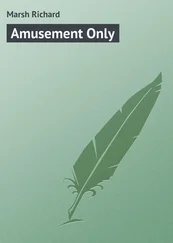Richard Marsh - Miss Arnott's Marriage
Здесь есть возможность читать онлайн «Richard Marsh - Miss Arnott's Marriage» — ознакомительный отрывок электронной книги совершенно бесплатно, а после прочтения отрывка купить полную версию. В некоторых случаях можно слушать аудио, скачать через торрент в формате fb2 и присутствует краткое содержание. Издательство: Иностранный паблик, Жанр: foreign_prose, на английском языке. Описание произведения, (предисловие) а так же отзывы посетителей доступны на портале библиотеки ЛибКат.
- Название:Miss Arnott's Marriage
- Автор:
- Издательство:Иностранный паблик
- Жанр:
- Год:неизвестен
- ISBN:нет данных
- Рейтинг книги:5 / 5. Голосов: 1
-
Избранное:Добавить в избранное
- Отзывы:
-
Ваша оценка:
- 100
- 1
- 2
- 3
- 4
- 5
Miss Arnott's Marriage: краткое содержание, описание и аннотация
Предлагаем к чтению аннотацию, описание, краткое содержание или предисловие (зависит от того, что написал сам автор книги «Miss Arnott's Marriage»). Если вы не нашли необходимую информацию о книге — напишите в комментариях, мы постараемся отыскать её.
Miss Arnott's Marriage — читать онлайн ознакомительный отрывок
Ниже представлен текст книги, разбитый по страницам. Система сохранения места последней прочитанной страницы, позволяет с удобством читать онлайн бесплатно книгу «Miss Arnott's Marriage», без необходимости каждый раз заново искать на чём Вы остановились. Поставьте закладку, и сможете в любой момент перейти на страницу, на которой закончили чтение.
Интервал:
Закладка:
It was not a pleasant dream, it did not leave an agreeable impression on her mind after she was awake. But dreams are only dreams. Sensible people pay no heed to them. Miss Arnott proved herself to be sensible at least in that respect. She did not, ever afterwards, refuse him a seat in her car, because she had once, in a nightmare, come to grief in his society. On the contrary, she not only took him for other drives, but- imitating her own experience with the Earl of Peckham, when, after a while-it was a very little while-he had attained to a certain degree of proficiency, she suffered him to drive her. And, as she had done, he liked driving so much that, before long, he also had an automobile of his own.
Then a new phase of the affair commenced. It was, of course, necessary that-with a view of extending her experience, and increasing her knowledge of motor cars-she should try her hand at driving his. She tried her hand, a first and a second time, perhaps a third. She admitted that his car was not a bad one. It had its points-but slight vibration, little noise, scarcely any smell. It ran sweetly, was a good climber, easy to steer. Certainly a capital car. So much she was ready to allow. But, at the same time, she could not but express her opinion that, on the whole, hers was a better one. There they joined issue. At first, Mr Morice was disposed to doubt, he was inclined to think that perhaps, for certain reasons, the lady's car might be a shade the superior. But, by degrees, as he became more accustomed to his new possession, he changed his mind. He was moved to state his conviction that, as a matter of fact, the superiority lay with his own car.
Whereupon both parties proceeded to demonstrate with which of the pair the palm of merit really lay. They ran all sorts of trials together-trials which sometimes resulted in extremely warm arguments; and by which, somehow, very little was proved. At anyrate, each party was always ready to discount the value of the conclusion at which the other had arrived.
One fact was noticeable-as evidence of the keen spirit of emulation. Wherever one car was the other was nearly sure to be somewhere near at hand.
Mrs Plummer, who had a gift of silence, said little. But one remark she made did strike Miss Arnott as peculiar.
"Mr Morice doesn't seem to have so many friends, or even acquaintances, as I should have expected in a man in his position."
"How do you know he hasn't?"
"I say he doesn't seem to have. He never has anyone at his own house, and he never goes to anyone else's. He always seems to be alone."
Miss Arnott was still. Mrs Plummer had not accentuated it in the slightest degree; yet the young lady wondered in what sense-in that construction-she had used the word "alone."
One day, when she was in town, Miss Arnott did a singular thing. Having deposited Mrs Plummer in a large drapery establishment, with peremptory instructions to make certain considerable purchases, she went off in a hansom by herself to an address in the Temple. Having arrived, she perceived in the hall of the house she had entered a board, on which were painted a number of names. Her glance rested on one-First floor, Mr Whitcomb. Without hesitation she ascended to the first floor, until she found herself confronted by a door on which that name appeared in black letters. She knocked; the door was opened by a very young gentleman.
"Can I see Mr Whitcomb?" she inquired.
"What name? Have you an appointment?"
"I have not an appointment, and my name is of no consequence. I wish to see Mr Whitcomb on very particular business."
The young gentleman looked at her askance, as if he was of opinion-which he emphatically was-that she was not at all the sort of person he was accustomed to see outside that door.
"Mr Whitcomb doesn't generally see people without an appointment, especially if he doesn't know their names; but if you'll step inside, I'll see if he's engaged."
She stepped inside to find herself in an apartment in which there were several other young gentlemen, of somewhat riper years; one and all of whom, she immediately became conscious, began to take the liveliest interest in her. Soon there appeared a grey-haired man, who held a pair of spectacles between the fingers of his right hand.
"May I ask what your name is? and what is the nature of the business on which you wish to see Mr Whitcomb?"
"I have already explained that my name doesn't matter. And I can only state my business to Mr Whitcomb himself." Then she added, as if struck by the look of doubt in the grey-haired man's face, "Pray don't imagine that I am here to beg for subscriptions to a charity or any nonsense of that kind. I wish to see Mr Whitcomb about something very important."
The grey-headed man smiled faintly, apparently amused by something in the caller's manner, or appearance. Departing whence he came he almost immediately reappeared, and beckoned to her with his hand.
"Mr Whitcomb is very much engaged, but he will manage to spare you five minutes."
"I daresay I sha'n't want to keep him longer."
She found herself in a spacious room, which was principally furnished, as it seemed to her, with books. At a table, which was almost entirely covered with books, both open and shut, stood a tall man, with snow-white hair, who bowed to her as she entered.
"You wish to see me?"
"You are Mr Whitcomb?"
"That is my name. How can I serve you?"
She seated herself on the chair towards which he pointed. Each looked at the other for some seconds, in silence. Then she spoke.
"I want you to tell me on what grounds a wife can obtain a divorce from her husband."
Mr Whitcomb raised his eyebrows and smiled.
"I think, madam, that it may have been a solicitor you wanted. I, unfortunately, am only a barrister. I fear you have made a mistake."
"I have not made a mistake; how have I made a mistake? I saw in a paper the other day that you were the greatest living authority on the law of marriage."
"It was very good of the paper to say so. Since I am indebted for your presence here to so handsome a compliment, I will waive the point of etiquette and inform you-of what you, surely, must be already aware-that the grounds on which a divorce may be obtained are various."
"I know that; that isn't what I mean. What I specially want to know is this-can a woman get a divorce from her husband because he gets sent to prison?"
"Because he gets sent to prison? For doing what?"
"For-for swindling; because he's a scoundrel."
Mr Whitcomb's eyebrows went up again.
"The idea that a marriage may be dissolved because one of the parties is guilty of felony, and is consequently sentenced to a term of imprisonment, is a novel one to me."
"Not if a girl finds out that the man who has married her is a villain and a thief? A thief, mind."
He shook his head.
"I find that that would be no ground for dissolution."
"Are you sure?"
"My dear young lady, you were good enough to say that some paper or other credited me with a knowledge of the laws dealing with the subject of marriage. I can assure you that on that point there is no doubt whatever."
"Is that so?" The girl's lips were tightly compressed, her brows knit. "Then there are no means whatever by which a wife can be rid of a husband whom she discovers to be a rogue and a rascal?"
"Not merely because he is a rogue and a rascal; except by the act of God."
"What do you mean by the act of God?"
"If, for example, he should die."
"If he should die? I see! There is no way by which she can be released from him except by-death. Thank you, that is all I wanted to know."
She laid on his table what, to his surprise, he perceived to be a twenty-pound note.
"My dear young lady, what is this?"
"That is your fee. I don't want to occupy your time or obtain information from you for nothing."
Читать дальшеИнтервал:
Закладка:
Похожие книги на «Miss Arnott's Marriage»
Представляем Вашему вниманию похожие книги на «Miss Arnott's Marriage» списком для выбора. Мы отобрали схожую по названию и смыслу литературу в надежде предоставить читателям больше вариантов отыскать новые, интересные, ещё непрочитанные произведения.
Обсуждение, отзывы о книге «Miss Arnott's Marriage» и просто собственные мнения читателей. Оставьте ваши комментарии, напишите, что Вы думаете о произведении, его смысле или главных героях. Укажите что конкретно понравилось, а что нет, и почему Вы так считаете.












